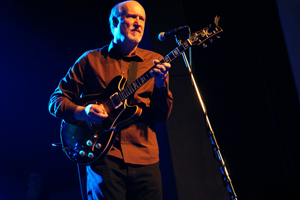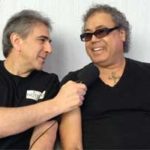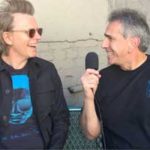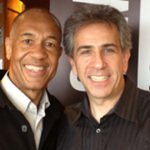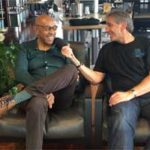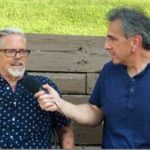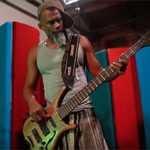Guitar icon recounts career highlights in exclusive one-on-one conversation
By Jon Liebman
December 8, 2017
John Scofield, Grammy-winning guitarist, composer and bandleader, has been making his mark on the worldwide music scene since the 1970s. Raised in suburban Connecticut, “Sco” attended Boston’s Berklee College of Music, where his mentors included jazz luminaries Gary Burton and Steve Swallow. His Berklee connections, coupled with young Sco showing a lot of promise as a professional musician, helped launch the guitarist’s career. Early gigs with Gerry Mulligan and Chet Baker – including a live recording at Carnegie Hall – captured the attention of the jazz community, and things quickly began to take off. Other early gigs included a European tour with the Billy Cobham/George Duke band, and contributing to an all-star album by iconic jazz bassist Charles Mingus. A major highlight of Sco’s career was being a member of Miles Davis’ “comeback” band in the early ‘80s. He also recorded and toured with revered tenor man Joe Henderson.
As a leader, Sco has released somewhere in the neighborhood of 40 albums, traversing a wide spectrum of musical genres. While generally classified as a “jazz” guitarist, Sco’s music can at times also be characterized as funk, R&B, blues, soul, rock – even country. Throughout his career, Scofield has also performed and/or recorded with an eclectic list of music notables, including Charlie Haden, Eddie Harris, Bill Frisell, Brad Mehldau, Joe Lovano, Pat Metheny, The Brecker Brothers, Herbie Hancock, Mavis Staples, Phil Lesh, Jaco Pastorius, John Mayer, Warren Haynes/Gov’t MuleTony Williams, Jim Hall, Ron Carter, Dave Holland, Terumasa Hino, Medeski, Martin & Wood, and many others.
Among his most recent projects is the multiple-Grammy-winning Country For Old Men, with bassist Steve Swallow, drummer Bill Stewart and keyboardist Larry Goldings. We caught up with Sco as he was just returning from a month-long tour with his current band, Hudson, which also includes drummer Jack DeJohnette, keyboardist John Medeski and bassist Larry Grenadier. The band’s eponymous album was released in June 2017.
FGPO: How’d you become a guitar player?
Sco: I grew up in Connecticut, in the suburbs of New York, and, along with just about everybody else in America, it seems that once the Beatles hit, rock & roll was it. That’s what I started with. I was just another kid who was into pop music. I got a guitar when I was 11. Actually, folk music was big then too. It (music) became my thing. I wasn’t good at sports. It was my way to be somebody (laughs).
FGPO: Who were your guitar heroes, or influences?
Sco: Well, you know, along with everybody else, I was into the guitar as this cool thing that you would see (with) bands on TV and (hear on) records by all the popular groups, which would be like the Beatles and that sort of thing. Pretty quickly, I got into blues. I was part of this big thing of suburban white kids that were into the real blues. I’d go hear Albert King. And B.B. King was my favorite. And Otis Rush. The blues guys, the urban blues guys. I became a complete blues nerd, and that lasted a couple of years. At the same time, I was playing in top 40 bands and stuff, like you could in the ‘60s. It was great because you could go play every weekend.
By the time I was about 16, I had heard about jazz. I knew that jazz was this extension of the music that I’d been playing. Like when you heard a guitar solo on a blues record, or a guitar break on a rock & roll tune, they were improvising in this style that was actually coming from jazz. And I just understood that connection without even knowing much. I understood that that was what was going on. Then I took lessons from a guy here in Connecticut, where I lived. He was a lot older than me, and he showed me so much. But I didn’t really play any jazz. In high school I had one friend who was way into jazz and we just sort of muddled our way through standards. He was a guitar player too. But that was it, really, until after high school (when) I went to Berklee College of Music.
FGPO: That must have opened your ears to, say, Wes Montgomery, Joe Pass…
Sco: Completely! I mean I had all these records. I was into it. And I’d also been lucky because I lived close to New York City, and we would take the train and go to the jazz clubs, to Slugs and the Village Vanguard and all that stuff, as well as hearing Hendrix and Clapton and all that in the ‘60s. So I had heard stuff, but I hadn’t really known that many kids that could play. When I went to Berklee, not only were there the teachers – and those guys were good – but there were other kids my age that were way ahead of me. So it was this incredible period for a couple of years there, when I went to Berklee, where I really improved a lot. All I did was practice and hang out with these other kids that knew far more than me. I kinda faked my way through it and got to meet Gary Burton and Steve Swallow. That was a big thing for me. Those guys were teaching there and they were really my mentors.
FGPO: How did your career get launched? What did you do immediately after you went to Berklee?
Sco: Well, I went for two years, and then I dropped out, which a lot of people did, because I was working around there, you know. I was playing. What happened to me I think is what still happens to everybody, that it’s the connections you make with the musicians. That’s how you get gigs. There was a great drummer in Boston, named Alan Dawson, who was the main guy up there. He taught Tony Williams and he played on a bunch of records. He was a famous jazz drummer too, but he taught at Berklee and he got me a gig with Gerry Mulligan. When Gerry Mulligan came to Boston he wanted to add guitar to his small group, so I got the gig for a week there. I was already starting to get ready to move to New York. I didn’t have a lot of connections, but I knew some guys (there). And then, at the exact same time that I played that week at the Jazz Workshop up in Boston with Gerry Mulligan, I also, somehow, met Billy Cobham, the great fusion drummer. I met Cobham through another guy who taught at Berklee, Dave Samuels, great vibes player, (who) got me in to playing virtually for free with this drummer in New York named Horace Arnold. Horace had a little group, but he didn’t have many gigs. He made a demo that his friend, Billy Cobham, produced. So I went in the studio with this band of young guys that Horace Arnold had put together. Billy Cobham was the producer, and Billy invited me to join his band.
So I had this great thing happen to me at the end of ’74, where I was playing with Gerry, and then Gerry got me on the gig with Chet Baker & Gerry Mulligan at Carnegie Hall because I played this week with Gerry, and it was like the next gig. And he said, “Hey, you wanna come and play at Carnegie Hall with me?” and I was like “What the …!” I couldn’t believe it. I was completely unprepared. So I went and did that with Chet and Gerry and I was shakin’ in my boots the whole time ‘cause it was a live record (Chet Baker and Gerry Mulligan Carnegie Hall Concert).
FGPO: Who else was in the band?
Sco: It was Ron Carter on bass, Harvey Mason on drums, Bob James on piano, and Dave Samuels, my friend the vibes player. We had played with Gerry that week in Boston, and then Gerry Mulligan and Chet Baker. It was their big reunion record that was on CTI records.
FGPO: I thought Gerry’s whole thing was to take the chording instruments, like piano and guitar, out of the band.
Sco: Yeah. This was… he went the other way, man. He had vibes, guitar and piano (laughs).
FGPO: Overcompensating?
Sco: Maybe so, yeah. So I got to do this great gig and at the same time I got hired to be in Billy Cobham’s band, replacing John Abercrombie in this incredible group that was, at the time, one of the big fusion bands in the fusion heyday, in 1975. January of ’75 is when I joined him. And the Brecker Brothers were in the band, which was a big thing for me, ‘cause I was a fan of their music. They hadn’t even made the Brecker Brothers album yet. They were just the hot guys in New York. I had heard them with Horace Silver and was a big fan of them. This was all when I was starting to move to New York, so it was a really great time for me.
FGPO: Tell me about working with Mingus. That must have been incredible.
Sco: Well the Mingus thing, I have to do a disclaimer here, because I only played with (him) on that one recording, which was one or two days in the studio. That was it. That’s the only time I ever met him or played with him. It was a great experience. Mingus decided he wanted to have guitar on this record, Three of Four Shades of Blues, which turned out to be the last record that Mingus ever played on, playing the bass.
FGPO: Isn’t George Coleman on that album?
Sco: George is in there, Lee Konitz, Jimmy Knepper on trombone, Dannie Richmond, the great drummer and all kinds of people. He used three guitars. Philippe Catherine and Larry Coryell were on it too. We all played at the same time (laughs).
FGPO: I interviewed Mike Stern not too long ago, and we were talking about Miles (Davis). Tell me about your experience with Miles. What was that like?
Sco: That was a huge thing for me. After I played with Cobham, that allowed me to move to New York City. I lived there, did that record with Mingus, did a bunch of other stuff. Two records with Jay McShann, which I’m very, very proud of. So I was on the scene in New York and there was this club called 55 Grand Street, where Mike Stern lived, upstairs from this bar. And Mike had come to town. He’d been up at Berklee and stuff. I didn’t really know him up in Boston, but he came to New York. This was, I don’t know, 1980 by now, or something. And they had this bar that he convinced to have music, and it became sort of one of the real spots for players.
FGPO: I saw him there once, with Jeff Andrews and Adam Nussbaum.
Sco: Okay, now that was the 55 Bar, on Christopher Street. This bar was 55 Grand Street. It’s really funny, but the two clubs that Mike was associated with. The first one was on a different street, in a different part of town. It was in Soho. It was called Grand Street. And there was a great scene there. And so I was playing with Mike all the time. And then Mike got the gig with Miles. Mike and Marcus (Miller) were playing with Miles. And after a year or two of those guys playing with Miles, I got in with Miles too. See, Miles wanted to have two guitars. It was a really important time for me because Miles had always been my favorite. I was a devotee of his music and had all his records, transcribed his solos. He was my favorite jazz improviser, so it was super heavy for me to join his band.
FGPO: What was he like as a leader?
Sco: (Laughs) I met this world-class character, man! This guy was really something else. At this point, this was his comeback. He was already the most famous guy in jazz. Period. He was this living legend. There was nobody else alive that… I mean even Sonny Rollins looked up and deferred to Miles Davis. There was nobody else in jazz like him. He had this mystique and aura. And I was buying the mystique and aura a hundred percent. But then I got around this guy and I realized this guy was an official superstar. He couldn’t go out on the street. People wanted to hang out with him. We would play gigs, and famous bands, you know, the most famous rock groups, would be waiting at the backstage door just to see him, just like fans. It was just weird. He was very impenetrable as a person, I thought. Plus, it was my own hangup, ‘cause I was completely in awe of him. Everything he said, we all took so seriously and everything. And he was kind of just up there fuckin’ around with people (laughs).
But the music always came first for him. When it came to playing, he lived for it. He had made such a mark as an improviser and as playing music in the moment that, for me, it was the same thing I’ve learned from all the great musicians in jazz that I’ve played with and that rubbed off on me. Something that I wanted to attain was this idea that we try to keep it fresh, that you don’t want to just get up there and play a bunch of licks and have it just be virtuosic music. That’s not what it’s about. Jazz is actually, at its best, something much more than that. It’s a cooperative group effort that contains that, but also has this energy and drive and spirit that comes from a group playing together and having a common goal. And Miles was completely committed to that and he taught me about that, that what I knew in theory could actually be done.
FGPO: There’s one more guy I’ve gotta ask you about. In around 1994, I saw you in Joe Henderson’s band, with Dave Holland and Al Foster. That show stands out as possibly the best concert I’ve ever attended.
Sco: Oh, yeah! Another highlight for me was getting to play with Joe as much as I did ‘cause he was also my idol and one of the great jazzmen. I didn’t play with him that much. That was one of the gigs I got to do with Joe where he augmented his existing trio, with me on guitar. And we did a record, So Near, So Far. But I remember that gig in Boston. Every time I got to play with Joe was a treasured moment for me. And what a rhythm section, Dave and Al. It doesn’t get any better than that.
FGPO: Let’s talk about Hudson. To me, it shows how your music is continually developing, continuing to evolve. It’s very different from the days with Gary Grainger and Dennis Chambers, or even last year’s Country For Old Men, but it still sounds like… you. How would you describe the band and the record?
Sco: Hudson is really a cooperative group. I’m in there, doing my thing, you know, but it’s Jack DeJohnette, one of the greats of jazz, ever, on drums. Jack wanted to do this group, put together as a project. We had all played together at this Woodstock Jazz Festival, just the one time, the first time we ever played together. And Jack said, “Hey, man, this came out well. Let’s do this. Let’s make a record and do all this.” And we came up with this idea. Since we all live in the Hudson Valley, Jack wanted to call the group Hudson. And then we came up with this idea to do a lot of music that’s associated with our area, where we live, which is Woodstock. We’re all north of the city, in the Hudson Valley. Woodstock, with the festival and all, the famous guys that lived there, like Dylan… And so we had all these covers that we tried to do. We tried to make jazz – I think we did, of a sort – out of these songs from the ‘60s. Then we wrote some stuff. It was just so great to play with those guys. (John) Medeski is the most vivid, visionary “colors man” in the world. He plays these different keyboards and just creates this tapestry, and it’s so much fun to be part of that. I played with him a lot. And Larry Grenadier, one of the greatest bass players, on upright bass.
FGPO: I always knew Jack DeJohnette also played the piano, but I never knew he was a singer too, so that was a bit of a surprise at the Detroit Jazz Fest.
Sco: Yeah, it’s fun, man. He sang and it was great.
FGPO: Tell me a little bit about your gear, John.
Sco: On both Hudson and Country For Old Men, I’ve just been playing right into the amp. I’ve been using this Ibanez AS200. I have two of them that I’ve used since the ‘80s, a black one and a sunburst one. The sunburst is from ’81, the black one’s from ’85. I had Norio Imai, my favorite guitar repair man, install Voodoo pickups on (the black one) that are copies of old Gibson pickups. That’s the one I’ve been using more lately, although I use them both. And just straight in through a Deluxe Reverb. I have an old one, a ’64, that I use for recording, and on the road I use rental backline. And I like the ’65 reissue Fender Deluxe Reverb amp that Fender currently makes. And that’s pretty much it. I’ve got a bunch of pedals (and) I used them a whole lot with my Überjam band. With some of the stuff with Medeski, Martin, Wood, I’ve used some effects, but lately I’ve just been pluggin’ in.
FGPO: D’Addario strings, right?
Sco: D’Addario strings on the Ibanez. I’ve been using this weird set, which is 12, 16, unwound 20, 32, 42, 52. Sometimes I go down to 11s. Sometimes I play a Telecaster, and I put 10s on that. I’ve been using D’Addario strings forever, it seems. They’re fantastic.
FGPO: What about the future, John? What else would you like to do that you haven’t already accomplished?
Sco: Well, I would just like to get better. I keep practicing jazz and writing tunes. What I’m doing now is trying to write tunes for a new record, jazz-type songs. Some of them are kind of “country jazz,” a little bit maybe, I don’t know. But I’m trying to write music and do this record with three great musicians that I love: Gerald Clayton, a great piano player; Bill Stewart, a drummer who I’ve made about a million records with; and a bass player named Vicente Archer, upright bass. I’m working on that.
I know we just went out on this tour with Hudson. We did a month, and by the end, somehow playing with great improvisers like that, with Jack DeJohnette, my chops were kind of up, which is not just physical, your agility and all that, but it’s your mind, how it works for improvising and how you’re able to put ideas together in your ears when you’re really hearing the other guys, and making what you play fit in with their stuff. I keep working on that. People say, “Oh, you’re already pretty good,” (but) it’s every day. You gotta work out and get it together and always keep it fresh and find a way to make the music even better. Jazz has been played so well that we all have this incredible level to live up to because it’s been done so well that my hands are really full, trying to battle this instrument every day (laughs), trying to get it to work right.
FGPO: We didn’t really talk about Country For Old Men. Is there anything you’d like to share about that?
Sco: Well, that was a great project for me ‘cause I got to play these tunes that are country classics. But we swung ‘em. We made modern jazz out of them. Sometimes we really took it out, too. I’m proud of that record because I feel like it just worked. I think anything good has to be natural in jazz, in music. It has to feel natural. It can’t feel too intellectual or forced. And this was a fusion of musics that just works like that. It’s like jazz and blues and country and stuff. It’s all so related that it’s fun to just put a little different spin on stuff. I really like that.
FGPO: That was with Steve Swallow, right?
Sco: Oh yeah! Now Steve, I told you, when I first went to Berklee, I met him. So we’ve been playing together since the ‘70s. And he’s really, I would say, my teacher, and has been. Although now we’re just old guys together.
FGPO: What would you be if you weren’t a guitar player?
Sco: I’d probably be in jail, or maybe working in a halfway house – if I lived (laughs). I really don’t know, ‘cause I’ve been into music so much, since I was 11. Like I said, I’m the weird kind of guy who just got into that and it’s been my main thing since then. I like to read books and watch movies, like everybody else, but I’m kind of boring. I don’t have any other big interests. I love my family, I love the musicians I play with and we just kind of bullshit and hang out all the time. It’s a blast.
Featured Products
- Hudson
- El Swing
- Lay Lady Lay
- Woodstock
- A Hard Rain’s A-Gonna Fall
- Wait Until Tomorrow
- Song For World Forgiveness
- Dirty Ground
- Tony Then Jack
- Up On Cripple Creek
- Great Spirit Peace Chant
- Mr. Fool
- I’m So Lonesome I Could Cry
- Bartender’s Blues
- Wildwood Flower
- Wayfaring Stranger
- Mama Tried
- Jolene
- Faded Love
- Just A Girl I Used To Know
- Red River Valley
- You’re Still The One
- I’m An Old Cowhand
